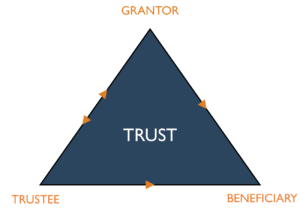The third point on the “trust triangle”, the beneficiary, is what it sounds like: the person who receives the benefit from a trust.

But the old adage definitely applies in this case: you can’t have your cake and eat it too. Remember that we’re talking about the roles or positions involved in creating a trust. The trustee role is the role that gets to have the cake. They possess, control, and safeguard the trust assets. The beneficiary role is the role that gets to eat the cake – they enjoy all the benefits the trust provides. While we’re at it, the grantor is the person who baked the cake.
Under Iowa law, beneficiaries have certain rights, but many (if not all) of these rights can be modified or even eliminated by the terms of the trust agreement. Generally, if the trust agreement does not say otherwise, a beneficiary has rights to the following:
- Loyalty from the trustee
- An annual accounting
- A copy of the trust instrument; and
- Impartial treatment by the trustee.
But remember that Iowa law allows the grantor of the trust to modify these rights in the trust document. So yes, even once the trust is in place and even after the grantor’s death, the grantor is always the person in charge of how the trust works. If you create the trust, you are in control.
Setting up a trust isn’t just a matter of defining who will fill the three roles on the trust triangle. Every trust is as unique as the person creating it. Through our unique LegacyGuard process, we can help you design a trust that provides for the beneficiaries that you want to support in the way you want to support them. Call us at (712) 737-3885 to get started designing the trust that’s right for you!


